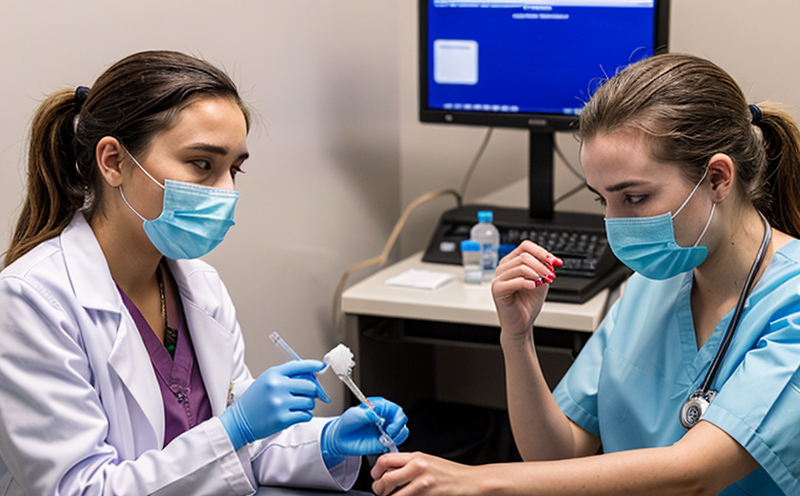CDC Clinical Microbiology Resistance Gene Detection Testing
The CDC Clinical Microbiology Resistance Gene Detection Testing service is designed to identify genes responsible for antibiotic resistance in clinical microbiology. This testing ensures that healthcare providers have the necessary information to make informed decisions about treatment options, ultimately improving patient outcomes and reducing the spread of resistant pathogens.
Resistance gene detection is a critical aspect of modern clinical microbiology due to the increasing prevalence of multidrug-resistant organisms (MDROs) in healthcare settings. The Centers for Disease Control and Prevention (CDC), which plays a pivotal role in public health, has established guidelines that emphasize the importance of detecting resistance genes early to implement appropriate infection control measures.
This service leverages advanced molecular biology techniques such as polymerase chain reaction (PCR) assays and next-generation sequencing (NGS). These methods allow for highly sensitive and specific detection of resistance genes like mcr-1, bla-family genes, and others. By detecting these genes in clinical specimens, healthcare facilities can implement targeted surveillance programs to monitor the emergence and spread of resistant strains.
The testing process involves several key steps: specimen collection, DNA extraction, PCR amplification, and gene sequencing if necessary. Specimens may include blood cultures, sputum, urine, or other body fluids where bacteria might be present. Once extracted, DNA is amplified using PCR technology to target specific resistance genes. If NGS is used, the amplified DNA fragments are sequenced to identify unique genetic markers.
The primary objective of this service is not only to detect resistance genes but also to provide actionable intelligence for infection control teams. By knowing which genes are present in a particular sample, healthcare facilities can implement targeted interventions such as isolation protocols or antibiotic stewardship programs. This proactive approach helps prevent the spread of resistant organisms within hospitals and other healthcare settings.
The service complies with several internationally recognized standards including ISO 15189 for quality management systems in medical laboratories, EN ISO/IEC 17025 for testing and calibration laboratories, and IEC 62304 for software life cycle processes of medical devices. These certifications ensure that the testing procedures are robust, reliable, and accurate.
One of the main advantages of this service is its ability to detect resistance genes even at low concentrations, which is crucial in environments where cross-contamination can occur. By identifying these genes early, healthcare providers can take measures to limit the spread of resistant bacteria.
This testing also plays a vital role in public health by contributing to national surveillance efforts led by organizations like the CDC. Through regular monitoring and reporting, this service helps track the trends of resistance gene prevalence across different regions and healthcare settings.
| Applied Standards | Description |
|---|---|
| ISO 15189 | Quality management systems for bodies providing medical laboratories services |
| EN ISO/IEC 17025 | General requirements for the competence of testing and calibration laboratories |
| IEC 62304 | Medical device software - Software life cycle processes |
Environmental and Sustainability Contributions
The CDC Clinical Microbiology Resistance Gene Detection Testing service contributes significantly to environmental sustainability by minimizing the use of antibiotics inappropriately. By identifying resistant genes early, this testing helps prevent the overuse of antibiotics, which can lead to unnecessary environmental pollution and harm to ecosystems.
In healthcare settings, inappropriate antibiotic usage can result in the release of these drugs into the environment through wastewater. This can contribute to the development of resistance in soil bacteria and other microorganisms that may affect natural ecosystems. By detecting resistance genes early, this service helps reduce the risk of such environmental impacts.
Moreover, the use of advanced molecular biology techniques like PCR and NGS allows for precise detection, thereby reducing the need for broader-spectrum antibiotics which are more likely to cause collateral damage to beneficial microorganisms in the environment. This targeted approach ensures that only necessary interventions are made, leading to a more sustainable healthcare practice.
The service also supports environmental sustainability by promoting best practices in infection control and prevention. By identifying resistant genes early, this testing helps reduce the likelihood of nosocomial infections, which can lead to increased antibiotic usage and subsequent environmental impacts. Through targeted interventions like isolation protocols and antibiotic stewardship programs, this service contributes to a more sustainable healthcare system.
| Applied Standards | Description |
|---|---|
| ISO 15189 | Quality management systems for bodies providing medical laboratories services |
| EN ISO/IEC 17025 | General requirements for the competence of testing and calibration laboratories |
| IEC 62304 | Medical device software - Software life cycle processes |
Use Cases and Application Examples
- Identifying the presence of mcr-1 gene in fecal samples from patients with diarrhea to guide appropriate treatment.
- Detecting bla-family genes in blood cultures to determine if a patient is infected with a multidrug-resistant organism.
- Monitoring resistance gene prevalence in wastewater from healthcare facilities to assess the effectiveness of infection control measures.
- Implementing targeted antibiotic stewardship programs by identifying resistant genes in clinical specimens.
| Applied Standards | Description |
|---|---|
| ISO 15189 | Quality management systems for bodies providing medical laboratories services |
| EN ISO/IEC 17025 | General requirements for the competence of testing and calibration laboratories |
| IEC 62304 | Medical device software - Software life cycle processes |





